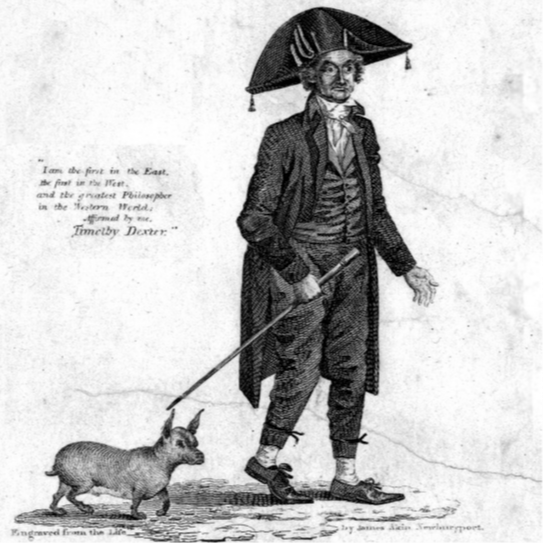Plain Truths From Timothy Dexter

Instrumentation: soprano and contrabass
Year Composed: 2013
Duration: 9-10 minutes
Program Notes:
Purchase Score
Timothy Dexter (1747—1806), of Newburyport, MA, the self-proclaimed Lord Dexter, King of Chester, the “voise of the peopel,” is one of American history’s most eccentric figures. Bizarre and reckless business ventures characterized his career; he sold warming pans and mittens to the West-Indies, he sold Bibles in non-Christian territories, he exported coal to Newcastle, England, the coal-producing capitol of the world. He attributed to business acumen what was really absurd luck; his shipment of coal, for instance, drew into Newcastle harbor just at the beginning of a local coal-workers’ strike. Much to the envy and astonishment of his rivals (“the Knowing Ones”), he amassed a huge fortune, which he spent in ways every bit as eccentric as the ways in which he acquired it. His opulent mansion was adorned with 40 statues of great men: George Washington, Napoleon, and of course himself. His own statue bore the inscription: “I am the first in the West, the first in the East, and the greatest philosopher in the known world.”
Timothy Dexter (1747—1806), of Newburyport, MA, the self-proclaimed Lord Dexter, King of Chester, the “voise of the peopel,” is one of American history’s most eccentric figures. Bizarre and reckless business ventures characterized his career; he sold warming pans and mittens to the West-Indies, he sold Bibles in non-Christian territories, he exported coal to Newcastle, England, the coal-producing capitol of the world. He attributed to business acumen what was really absurd luck; his shipment of coal, for instance, drew into Newcastle harbor just at the beginning of a local coal-workers’ strike. Much to the envy and astonishment of his rivals (“the Knowing Ones”), he amassed a huge fortune, which he spent in ways every bit as eccentric as the ways in which he acquired it. His opulent mansion was adorned with 40 statues of great men: George Washington, Napoleon, and of course himself. His own statue bore the inscription: “I am the first in the West, the first in the East, and the greatest philosopher in the known world.”
Though nearly illiterate, Dexter published a book in 1802, “A Pickle for the Knowing Ones, or Plain Truths in a Homespun Dress.” Part memoir, part manifesto, part sermon, the book provides a window into his meandering stream of consciousness. While the text is nearly indecipherable with its unique spelling and total lack of punctuation, Dexter’s rambling treatise contains kernels of wisdom, humor, and even poetry.
This piece, Plain Truths from Timothy Dexter, isolates some of those quasi-poetic fragments and treats them as song-text. It is neither my intention to aggrandize nor ridicule the author. Rather, I hope to share my personal intrigue into a person whom an essayist for the Historical Society of Old Newburyport described as “a living exception to all general rules, and a living contradiction to all maxims of human wisdom.”
I. If you can bare the trouth
I. If you can bare the trouth
If you can bare the trouth I will tell the trouth
II. we come into the world
all we know is we are here, we come into the world crying and gone out groaning*
III. Day and Night
I stay at home praying for theavs and Rougs to be saved Day and Night praying for siners poour creaters
IV. Regoising
To mankind at Large the time is Com at Last the grat day of Regoising
V. Let the Devil goue into Darknes
Let the Devil goue into Darknes and take his due
VI. just fineishing his sermon
just fineishing his sermon he says o good lord I hop you will consider what foue hints I have given
VII. to be A king
it is hard work to be A king ... it is harder than tilling the ground
VIII. the shaking quickers
her Lamp bourning the Lamps trimmed with glorey the shaking quickers
IX. good-bye
I am a frind to all onnest men A friend to good order, honor to whom it belongs, to great men a friend – to all good citizens and honest men good-bye. *
*Italicized texts are excerpted from a later portion of Dexter’s book, in which his peculiar grammar and spelling was corrected by an editor.
website and contents © 2025 John Liberatore |
site design/dev: ridge ten creative